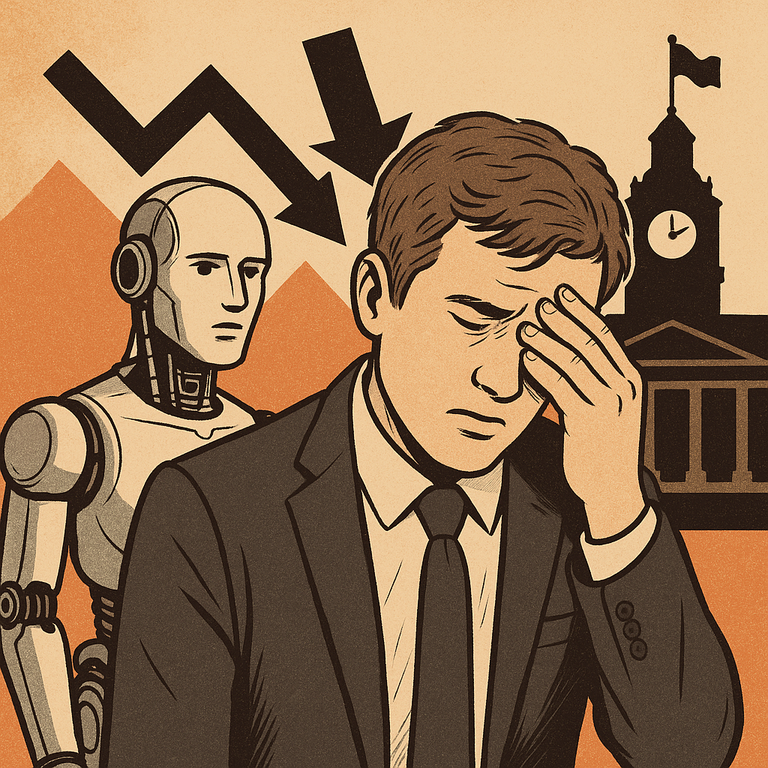It's government policy, not AI that's driving the declining labour market...
Don't Blame ChatGPT for the Jobs Crisis – Look to Policy Instead
The rise of AI is often talked about as being a future job destroyer. Headlines warn that computers will displace humans on a massive scale, and studies have a tendency to identify entire professions subject to the risk of automation.
However, although AI technology like ChatGPT has disrupted some industries, there's a lot more to the real tale of Britain's declining entry-level jobs market.
Namely, if we want to explain why we've got a weak labour market, we should look at government policy, and ironically, specifically the policies of the Labour party.
The shrinking graduate job market...
Figures reveal a depressing drop in opportunities for new graduates....
New graduate jobs in the UK have fallen by a third since just three years ago, and around 630,000 graduates are on benefits, which is bad news for those graduating university this summer.
And where this trend is concerned AI is a convenient scapegoat....
Artificial intelligence may well be transforming the way companies do business and will potentially replace huge numbers of jobs someday. But not yet.
Few companies have come to the point where automating employees with AI is commonplace. Many businesses are still at the experimental stage, trying to work out where these tools sit in their processes. So why is the graduate labour market in such profound trouble already?

The Burden of Policy on Business
The real decline in graducate jobs is that government policy has made it less attractive than ever before for employers to hire new graduates.
The obvious exmaple here is that businesses are now grappling with higher National Insurance contributions, the equivalent of an employment tax. Already stretched by inflation and petrol prices, employers now have additional expenses with every new recruit. With additional layers of bureaucracy and red tape, the overall effect is catastrophic on graduate recruitment.
Final thoughts: tech as the scapegoat...
While AI is in the news, it's something of a scaegoat, it's more likely that government policies are stifling the job market!
The truth is firms see it as too expensive to risk hiring new talent, and with that in mind, they turn to AI instead, it's not AI that is the driver here.
Nail on the head. If you look at the effect of business rates on small businesses, it has been the largest recorded increase ever. This evil tax which businesses pay regardless of turnover is destroying the UK and you can see it all over the high street. Who would start a business in this environment?!!
The stats speak for themselves:
It's an insane vacancy rate! See it all over the place!
Government changing the rules to advantage big corporations and London.
I do not disagree with your assessment.
AI is a convenient scapegoat, but it is not as intrusive as government policy into all aspects of how companies generate revenue. There are simply too many forms to fill and boxes to tick before even making a single product or providing a service. There is a cost beyond wages and benefits.
I think the drop in job opportunities for graduates can't just be blamed on AI; it's really the government's way of handling business that's affecting employment rates.
We need to change the way businesses are conducted from the root level. A new model is needed..
These things always have a mix of reasons, but governments can do a lot to create the right environment. People are spending a lot on their education and they need opportunities. AI will be a big factor in the next few years, so we need to prepare (whilst I'm looking at retirement).
I'm just glad I'm at the back end of my working life too!
Just today I talked with a friend about that. He writes resumes for techs, and is really good at it. We talked about how LLM are affecting the tech-workforce, and he said it's not AI that is taking the jobs, but the fact that nothing new is being created. All that is now required is what they call "maintenance", meaning pushing a buggy update every two weeks that makes things worse. And they don't need many people for that.
Sarcasm aside, he has a point. And until now, most LLM are not that good to really hit the labor market. Yet. They might improve in coding and such. The good news is that this opens up the opportunity for trades. LLM won't be able to build houses for quite a while, or plumbing, or wiring. And at least in Germany, trade is looking desperately for workers, both trained and to-be-trained.
Your reply is upvoted by @topcomment; a manual curation service that rewards meaningful and engaging comments.
More Info - Support us! - Reports - Discord Channel
I hear you - when AI gets applied to physical bots things will get mega disruption